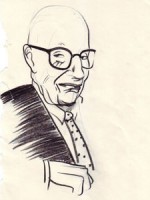Title
“I hear he can bench-press his own body weight …” “I hear he’s never had a drop of liquor in his life …” “If you are late for his class you have to wait outside until the period is over …” These were the first rumors I heard about Juilliard’s renowned speech teacher, Robert Neff Williams. As first-year drama students, we would see him walking down the hall, impeccably dressed, spine erect, and we found ourselves forming a respectful line against the wall as he passed—like soldiers waiting for inspection. While time proved most of these rumors apocryphal, the unfailing intensity of purpose with which he approached the task of teaching us to speak clearly and expressively accounted for much of the surrounding invention. You see, he is an icon.
Body
I would like to speak a bit about Mr. Williams’s teaching work at The Juilliard School, as there are many people outside of the Drama Division who are unfamiliar with it. An uncommonly tall man, he never stoops but holds himself perfectly erect, making it impossible for his much younger students to justify a slouch under any circumstances. He is not above using humor to chide his pupils into performing more effectively. I’ve seen many a young actor’s face slump when his or her attempt at a section of Molière was met with a mock shudder, and a terse, “Try it again … but better.” He has a wicked sense of humor. Masterful writing is built upon opposition: antithesis, a long thought followed by a short one, a grandiose phrase undercut by a mundane statement. Mr. Williams teaches his students the principles of rhetoric necessary to illuminate such writing. A contrast on the page must sound like a contrast when spoken aloud. Mr. Williams teaches actors to employ shifts in volume, pitch, or duration to illuminate the difference between This … and That. His work is so important in terms of communicating the complexity of great texts. Speak a line of Shakespeare for him, thinking you were conveying the meaning, and he will show you three hidden meanings you missed completely. The work is crucial because it is about illuminating subtlety and nuance—and that is what good writing is all about. The difference between speaking the words and painting their meaning with your voice is, as Mark Twain said, “the difference between lightning and a lightning bug.”
If you think this work sounds like enough to fill Mr. Williams’s time, you’re wrong. In addition to his 38 years on the Juilliard drama faculty, Mr. Williams was in charge of the speech division at Columbia University until 1990. He served as a speech consultant for Hallmark Hall of Fame television productions, and he has received the Folger Shakespeare Library Theater Fellowship. His credits include Broadway, Off Broadway, and regional theater.
Additionally, Mr. Williams has worked with the Pearl Theater for more than 20 seasons. For those of you who are unfamiliar with this extraordinary New York company, the Pearl is unique for several reasons. It is one of the few theaters in the country with its own resident acting company. This means the same actors are working together in various productions, year round. They have the opportunity to grow as a company, and continue their training together. The company never stops learning and growing. And all of this technical development is necessary, because the Pearl is dedicated to performing classical texts and, as I mentioned before, these great works are both intellectually demanding and technically rigorous. And it was Mr. Williams who developed the Pearl’s core speech and text training program, in addition to directing many successful productions with their resident acting company. Recently, the Pearl decided to return the favor.
On November 3, the Pearl Theater celebrated its 25 year anniversary, and marked the milestone with an event honoring its beloved text and speech coach, Robert Neff Wiliams, by announcing the Robert Neff Williams Classical Theater Program. The program will serve as an annual fund to support their resident acting company’s ongoing artistic development and the Pearl’s priorities: actor salaries at a living wage, ongoing training, and the production of classic plays that necessitate large casts of trained artists. The Pearl states: “We believe that a group of artists who train together over time are best equipped to illuminate the path of human experience through the time-tested stories we present on our stage.”
This statement could not be more thoroughly embodied than by Mr. Williams and his extraordinary body of work.





